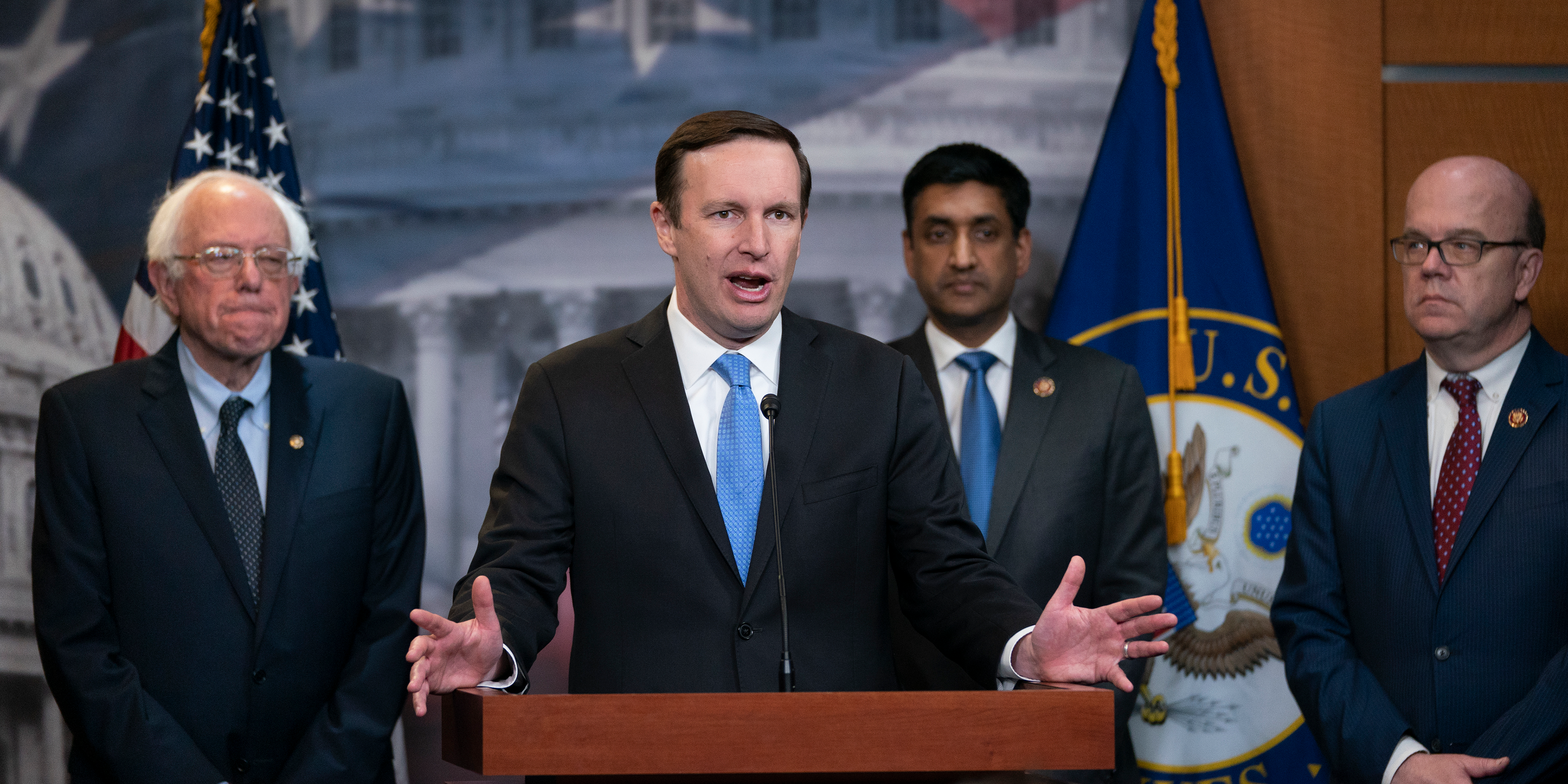- A bipartisan group of lawmakers sent a letter to President Donald Trump asking for a meeting to discuss a resolution to end US support for Saudi Arabia in Yemen.
- The resolution has passed in both chambers of Congress, but the Trump administration has signaled the president will veto it.
- “Our hope is just that he will take a meeting. I’m convinced if we have a meeting with him that we’ll be able to convince him to sign this,” Democratic Rep. Ro Khanna, who signed the letter, told INSIDER on Friday.
- “He could help, literally by the stroke of his pen, save millions of lives from possible famine,” Khanna said of Trump.
A bipartisan, bicameral group of lawmakers on Thursday sent a letter to President Donald Trump strongly urging him to sign a resolution that would end US support for the Saudi-led coalition in Yemen.
The letter requests a meeting with Trump at his “earliest convenience” to discuss the resolution. It was signed by Democratic Rep. Ro Khanna, Republican Rep. Matt Gaetz, Democratic Rep. Mark Pocan, Democratic Rep. Pramila Jayapal, Republican Rep. Thomas Massie, Democratic Rep. Barbara Lee, Republican Sen. Mike Lee, Republican Sen. Rand Paul, and Sen. Bernie Sanders.
The resolution, which was sponsored by Sanders, passed in the Senate in March and went on to pass in the House on Thursday. This marked the first time in history a resolution invoking the War Powers Act of 1973 was passed in both chambers of Congress.
The Trump administration has signaled the president will veto the resolution, but the letter sent to him on Thursday implores the commander-in-chief to forego this route.
Millions are facing starvation in a war that's already killed thousands
"We respectfully ask you to sign into law Senate Joint Resolution 7, which invokes the War Powers Act of 1973 to end unauthorized US military participation in the Saudi-led coalition's armed conflict against Yemen's Houthi forces, initiated in 2015 by the Obama administration," the letter states.
In making their case for the resolution, the lawmakers cited a directive Trump signed in late 2017 for Saudi Arabia to "immediately" lift its blockade on Yemen to "completely allow food, fuel, water, and medicine to reach the Yemeni people who desperately need it."
Read more: US senators furious with Saudi Arabia after classified briefing with CIA Director Gina Haspel
"Unfortunately, the Saudi-led coalition's imposition of an air-land-and-sea blockade as part of its war against Yemen's Houthis has continued to prevent the unimpeded distribution of these vital commodities, contributing to the suffering and death of vast numbers of civilians throughout the country," the letter said.
Millions of people are facing starvation due to the Yemen war, which the letter emphasizes, and it's estimated to have killed roughly 60,000 people.
The lawmakers said that by signing the resolution, Trump could send a "powerful signal to the Saudi-led coalition to bring the four-year-old war to a close" and help end the world's worst humanitarian crisis.
The letter taps into Trump's anti-interventionist rhetoric he engaged both during his campaign and presidency, making the case ending US involvement in Yemen will align with his condemnation of "a bipartisan tendency to be drawn into costly and never-ending conflicts across the globe and its devastating impacts for American service members and taxpayers."
Khanna: 'I'm convinced if we have a meeting with him that we'll be able to convince him to sign this'
Khanna, who led the charge on this resolution in the House and was among the lawmakers to sign the letter to Trump, told INSIDER in a phone call on Friday evening that he hadn't heard back from the Trump administration yet. But he also noted the president was traveling and has 10 days under the law to consider it.
"Our hope is just that he will take a meeting. I'm convinced if we have a meeting with him that we'll be able to convince him to sign this," Khanna said, contending the presence of Paul and Gaetz, two Trump allies, would buoy the effort.
Khanna said he would make three arguments to Trump in the meeting, "First, he'd be the first president in American history to sign a war powers resolution. It would help fulfill part of his vision of ending endless wars. Second ... he would send an extraordinary message to the Saudis to lift the blockade and allow humanitarian aid into Yemen," Khanna said.
He continued: "And he could help, literally by the stroke of his pen, save millions of lives from possible famine. And third, this gives him some ability to speak out against the Saudi action in Yemen, which is related to the Khashoggi murder, while still pursuing other relationships with the Saudis he thinks are necessary for US interests."
The push for ending US support for the Saudi-led coalition in Yemen gained significant momentum after the brutal killing of Saudi journalist Jamal Khashoggi.
Khashoggi was killed in the Saudi consulate in Istanbul in October. His death is widely suspected to have been orchestrated by Crown Prince Mohammed bin Salman, the de facto ruler of the kingdom who's also considered the architect of the Yemen conflict. Khashoggi had been critical of the Saudi government in his writing, especially when it came to Yemen.
Trump has faced bipartisan pressure to respond more forcefully to Khashoggi's killing, but he's so far refused to budge. The president has justified his stance by citing what he feels is a beneficial strategic partnership with Riyadh, as well as the economic gains of US arms sales to Saudi Arabia.
The resolution does not call for the US to end arms sales to the Saudis, which the bipartisan letter to Trump explicitly notes.
'[Trump] could use a bipartisan win at this point'
Khanna also said signing the resolution would be "politically popular" with Trump's base, which has cheered on his professed desire to get the US out of the Middle East.
"My sense is that [Trump] is getting advice from a circle of advisers, part of the foreign-policy establishment, and they're probably not telling him the details of what this resolution actually does," Khanna went on to say. "I don't know if he's been briefed that the resolution memorializes what his administration has already started to do."
There are people in his administration with concerns about "the precedent it will set in terms of limiting the commander-in-chief from further interventions without Congress," Khanna said, and supporting the resolution could hurt Trump with certain cohorts of conservatives in Washington.
At the same time, the California lawmaker said there's very little "political downside" for Trump with "actual voters" in signing the resolution.
"The president has the opportunity to say, 'I campaigned on stopping these endless wars. I'm pulling our troops out of Afghanistan. I'm pulling our troops out of Syria. And I'm stopping a war in Yemen,'" Khanna said. "It's very consistent with how he campaigned."
Khanna also made the case that signing the resolution would help silence Democratic critics who've questioned the nature of the relationship between Trump and Saudi Arabia in the wake of Khashoggi's killing.
"It would give him credit with quite a few Democrats on the Hill, and I feel like he could use a bipartisan win at this point, given how contentious the environment is," Khanna said.
The White House did not immediately respond to a request for comment from INSIDER.

